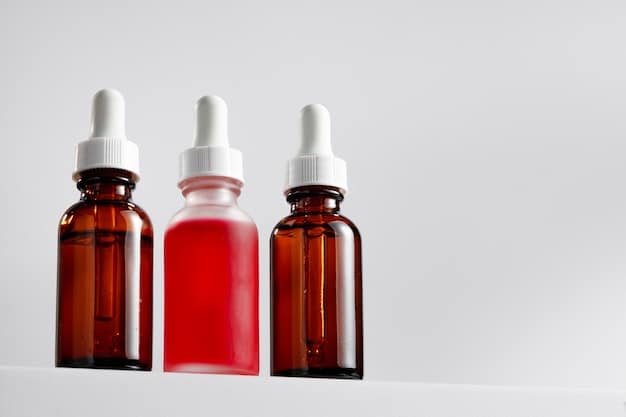The Role of Serums in Your Skincare: Find the Perfect One

Serums are concentrated skincare treatments designed to deliver potent ingredients directly to the skin, targeting specific concerns such as wrinkles, hydration, and brightness, making them a crucial part of any effective skincare routine.
Unlock radiant, healthy skin by understanding the role of serums in your skincare routine: choosing the right one for your needs. This guide simplifies the world of serums to help you make the best choices.
Understanding Serums: What Makes Them Special
Serums have become a staple in many skincare routines, but what exactly sets them apart? Unlike regular moisturizers or cleansers, serums are formulated with a high concentration of active ingredients. This allows them to penetrate deeper into the skin and deliver targeted results.
The key to understanding serums lies in their formulation and specific benefits, as they are designed to address various skin concerns effectively.
Concentrated Formulas
One of the primary reasons serums are so effective is their concentrated formulas. These formulations contain a potent blend of active ingredients, such as vitamins, antioxidants, and peptides, which are designed to tackle specific skin issues.
- Higher Potency: Serums typically have a higher concentration of active ingredients compared to other skincare products.
- Targeted Action: Designed to address specific concerns like aging, hyperpigmentation, or hydration.
- Fast Absorption: Lighter formulations ensure quick and deep penetration into the skin.
The high potency and targeted actions of serums make them invaluable for achieving noticeable improvements in skin health and appearance.

Identifying Your Skin Needs
Before diving into the world of serums, it’s crucial to identify your specific skin needs. Understanding your skin type and primary concerns will guide you in choosing the most effective serum.
Determining whether you have dry, oily, sensitive, or combination skin, alongside your particular skin concerns, is key to selecting the right serum.
Common Skin Concerns
Many people face common skin concerns that serums can effectively address. These issues often drive the choice of serum, as different ingredients target different problems.
- Aging: Fine lines, wrinkles, and loss of elasticity.
- Hyperpigmentation: Dark spots, sun damage, and uneven skin tone.
- Dehydration: Dryness, flakiness, and a tight feeling in the skin.
Key Serum Ingredients and Their Benefits
Navigating the world of serum ingredients can be overwhelming. Understanding what each ingredient does will help you make an informed decision and choose a serum that best matches your skin’s needs.

From antioxidants to hydrating agents, each serum ingredient offers unique benefits that can improve skin health and appearance.
Vitamin C
Vitamin C is a potent antioxidant known for its brightening and anti-aging properties. It helps to protect the skin from environmental damage and promote collagen production.
Incorporating Vitamin C can lead to visibly brighter and more youthful-looking skin.
Hyaluronic Acid
Hyaluronic acid is a powerful hydrating ingredient that can hold up to 1000 times its weight in water. It helps to plump the skin and reduce the appearance of fine lines and wrinkles.
Serums containing hyaluronic acid are perfect for those with dry or dehydrated skin.
Retinol
Retinol, a derivative of Vitamin A, is widely recognized for its anti-aging benefits. It helps to accelerate cell turnover, reduce wrinkles, and improve skin texture.
Introducing retinol into your skincare regimen can result in smoother, firmer skin over time.
How to Incorporate Serums into Your Routine
Knowing how to properly incorporate serums into your skincare routine is essential to maximize their benefits. The order in which you apply your products can significantly impact their effectiveness.
Applying serums correctly ensures they penetrate deeply and work harmoniously with other skincare products.
Layering Techniques
Layering your skincare products in the correct order is crucial for optimal absorption. Serums should be applied after cleansing and toning but before moisturizers.
- Cleanse: Start with a clean base to remove dirt and impurities.
- Tone: Balance the skin’s pH levels.
- Serum: Apply serum to deliver concentrated ingredients.
The correct layering ensures that serums can penetrate deeply and provide maximum benefits.
Common Mistakes to Avoid
Despite their benefits, many people make common mistakes when using serums, which can hinder their effectiveness or even cause skin irritation. Avoiding these pitfalls ensures you get the most out of your serum.
Understanding common serum usage mistakes helps you refine your routine and achieve better skincare results.
Overuse of Product
A common mistake is using too much serum. Because serums are highly concentrated, only a few drops are needed to cover the entire face. Overusing the product can lead to irritation and clogged pores.
Using the correct amount of serum ensures your skin absorbs the active ingredients without adverse effects.
Ignoring Ingredient Combinations
Some ingredients should not be used together, as they can cause irritation or reduce effectiveness. For example, combining retinol and Vitamin C can destabilize both ingredients, rendering them less potent.
Being mindful of ingredient compatibility ensures that your skincare routine remains effective and gentle.
Expert Tips for Serum Selection
Choosing the right serum can be daunting, but with some expert tips, you can narrow down your options and make the best choice for your skin.
Seeking expert advice can guide you toward serums that align with your skin type, concerns, and preferences.
Read Reviews and Seek Recommendations
Pay attention to product reviews and recommendations from dermatologists or skincare experts. These insights can provide valuable information about the effectiveness and suitability of different serums.
- Check Credible Sources: Look for reviews from recognized skincare professionals.
- Consider Multiple Opinions: Read a variety of reviews to get a balanced perspective.
| Key Aspect | Brief Description |
|---|---|
| ✨ Serum Basics | Serums are concentrated treatments offering targeted benefits to specific skin concerns. |
| 🔍 Skin Needs | Identify your skin type and key concerns before choosing a serum for effective results. |
| 💧 Key Ingredients | Common ingredients like Vitamin C, Hyaluronic Acid, and Retinol target different concerns. |
| 📅 Routine Integration | Apply serums after cleansing and toning for optimal absorption and effectiveness. |
Frequently Asked Questions
▼
A serum is a skincare product with a high concentration of active ingredients, designed to penetrate deeply into the skin. Serums target specific concerns, such as wrinkles, hydration, and brightness.
▼
Incorporate a serum after cleansing and toning, but before applying moisturizer. This allows the serum to deliver its concentrated ingredients directly to the skin without interference.
▼
Yes, you can use more than one serum, but be mindful of the ingredients. Avoid combining products with potentially irritating combinations, such as retinol and vitamin C, in the same application.
▼
Typically, only a few drops of serum are needed. Serums are highly concentrated, so just a small amount can effectively cover the entire face. Overuse can lead to irritation or clogged pores.
▼
No, serums should not replace moisturizers. Serums deliver active ingredients, while moisturizers hydrate and protect the skin surface. Both are crucial for a balanced skincare routine.
Conclusion
Choosing the right serum and incorporating it effectively into your skincare routine can significantly enhance your skin’s health and appearance. By understanding your skin’s needs and the potent ingredients available, you can achieve a radiant and youthful complexion.





